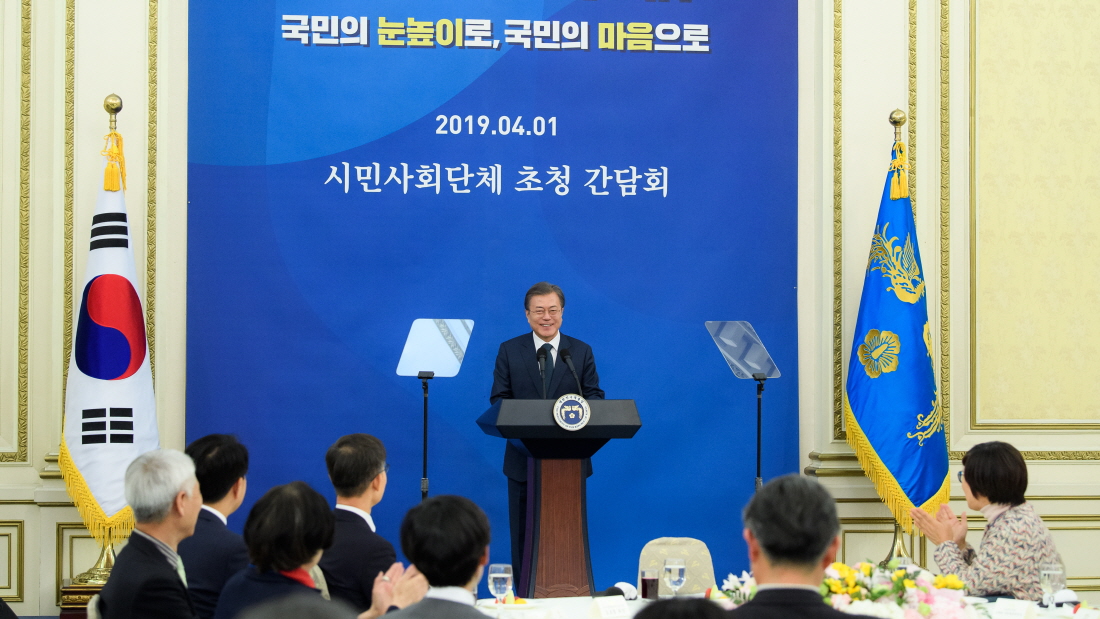이 웹사이트는 제19대 대통령 임기 종료에 따라 대통령기록관이 「대통령기록물 관리에 관한 법률」에 의해 이관받아 서비스하는 대통령기록물입니다. 자료의 열람만 가능하며 수정 · 추가 · 삭제는 불가능합니다.
다만, 「개인정보보호법」에 의하여 개인의 정보를 보호받기 원하시는 분은 관련 내용(요청자, 요청내용, 연락처, 글위치)을 대통령 웹기록물 담당자(044-211-2253)에게 요청해 주시면 신속히 검토하여 조치해 드리겠습니다. 감사합니다.
SPEECHES & REMARKS
BRIEFINGS
Opening Remarks by President Moon Jae-in at Meeting with Leaders of Civil Society Organizations

Leaders of civil society organizations, I am glad to meet you all.
Joining us here today are leaders of civil society organizations that represent different walks of life in Korea. I share a sense of camaraderie with you as I once spent quite a long time participating in the activities of various local civil society organizations. I hope you feel comfortable during this event today.
Relationships between the Government and civil society are not invariable. These relations ebb and flow sometimes and are tense other times. I’d like to believe that Government-civil society ties are good now. Am I correct in believing this way?
Any way we look at it, collaborative governance relations between the Government and civil society and their partnerships in running state affairs have been increasingly strengthened and advanced.
It is the preserve of the Government and politicians to make laws and institutions and allocate national resources, but civil society plays a role in demanding and leading efforts for improvements in laws and institutions and the appropriate allocation of national resources and creating momentum in this process.
Civil society in Korea has been spearheading our social progress and doing better than anyone in fulfilling such important roles as putting checks on and offering critiques of the state and presenting alternatives.
As times change, problems for society to tackle have become more complicated and diverse. Economic justice, socio-economic polarization, human rights, gender equality, the environment and ecology as well as consumer protection, inter-Korean relations and climate change response on a global scale – such problems which require our collective wisdom and joint solutions from around the world lie ahead of us.
The Government is limited in what it can do. Therefore, civil society has taken on even greater roles in that regard.
My Administration was launched by upholding the aspirations expressed through the candlelight rallies. Civil society, which played a leading role in the candlelight revolution, constitutes a partner for and also a participant in the administration of state affairs. Your voices equal the people's voices.
I hope you all will become partners in leading our society together while continuing to play the role of stern monitors as well.
Although the Government is doing its utmost, the role of other entities is crucial in those areas beyond a government's reach.
To a large extent, peace on the Korean Peninsula has to be addressed politically and diplomatically. Still, since hostilities and confrontations have persisted for a long time, it is also very important to help the people recognize peace as the most precious value and practice it in their everyday life. I request your cooperation to ensure that peace in the people's daily lives leads to peace for the Korean Peninsula.
Fine dust is directly related to the people's lives and health. Since the issue has a bearing on power plant management, energy supply and demand, jobs and the livelihoods of low-income families, it is regrettable that it can't be tackled in the short term. In line with the promise made to the people, we will respond to the issue by swiftly setting up a pan-government organization that incorporates professionals, citizens and officials from public institutions.
A fair economy, women, young people and consumer protection – we cannot afford to pay any less attention to each of these issues. The people do not condone even slight unfairness in their everyday lives. I hope you will work as outside monitors for the sake of a fair economy and consumer protection and pool your wisdom concerning women and youth issues as well.
Of particular importance is to achieve social consensus with regard to grave pending issues that are highly likely to cause conflict.
Now, social consensus is being sought, mainly through the Economic, Social and Labor Council, on such issues as improving regulations to urge compliance with the 52-hour workweek and a system for determining the minimum wage as well as ratifying ILO Core Conventions and upgrading the post-retirement income guarantee system. In addition, without social consensus, it is impossible to come up with countermeasures to an aging society with low fertility, which is an inevitable, fundamental transformation facing our society, and solutions to the problems related to changes in jobs and the people's lives in the era of the Fourth Industrial Revolution.
These are crucial tasks for which the Government and civil society need to pool wisdom.
My Administration chose preparing the foundation for the growth of civil society as one of our top priorities. Now, it is in the process of helping legislate a civil society development framework act and aims to stimulate civil society through the Civil Society Development Committee.
The Office for the Senior Secretary to the President for Civil Society was set up in the Presidential Secretariat as a way to strengthen direct communication. Many figures from civil society are already working for Cheong Wa Dae, the National Assembly and various government committees. I will work to further develop such cooperative governance.
The centennial of the Provisional Republic of Korea Government’s founding will soon be here. During the next century of the Republic of Korea, the growth of each citizen will directly lead to our national growth. Internally, we need to unify people beyond ideological confrontation, and externally, we need to achieve peace and prosperity.
Along that path, you are not merely critics but main actors taking initiative and key players in a society that is ever changing.
I consider this opportunity today as an occasion for carefully listening to you. I hope that you will give candid opinions.
Thank you.



